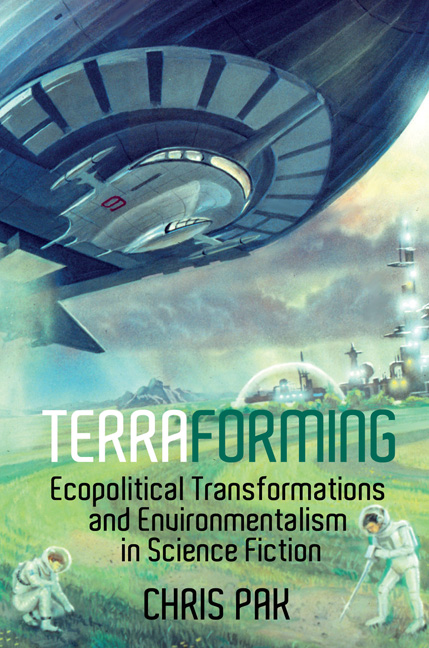Book contents
- Frontmatter
- Dedication
- Contents
- Acknowledgements
- Introduction: Terraforming: Engineering Imaginary Environments
- 1 Landscaping Nature's Otherness in Pre-1960s Terraforming and Proto-Gaian Stories
- 2 The American Pastoral and the Conquest of Space
- 3 Ecology and Environmental Awareness in 1960s–1970s Terraforming Stories
- 4 Edging Towards an Eco-cosmopolitan Vision
- 5 Kim Stanley Robinson's Mars Trilogy
- Conclusion
- Works Cited
- Index
3 - Ecology and Environmental Awareness in 1960s–1970s Terraforming Stories
- Frontmatter
- Dedication
- Contents
- Acknowledgements
- Introduction: Terraforming: Engineering Imaginary Environments
- 1 Landscaping Nature's Otherness in Pre-1960s Terraforming and Proto-Gaian Stories
- 2 The American Pastoral and the Conquest of Space
- 3 Ecology and Environmental Awareness in 1960s–1970s Terraforming Stories
- 4 Edging Towards an Eco-cosmopolitan Vision
- 5 Kim Stanley Robinson's Mars Trilogy
- Conclusion
- Works Cited
- Index
Summary
The 1960s–1970s New Wave of sf was a period of experimentation during which the tropes of the 1950s pulp tradition were transformed. Ecological concerns became an integral element of the socio-political engagement of the terraforming stories of this period. Responding to the impact of the 1960s counterculture, sf began to diverge from the consensus futures of the 1950s. Depictions of proto-Gaian worlds were directly associated with the motif of terraforming and presented counter-arguments against planetary adaptation. Although ecological themes have fed into representations of terraforming since the 1930s, terraforming stories of the 1960s–1970s were premised on the emergence of new ecological landscapes that reflected a sense of environmental urgency. The scientific aspects of ecology were combined with a strand of mysticism reminiscent of early twentieth-century vitalism, but were informed by a growing popular interest in socio-political institutions and practices alternative to those ideologically dominant at the time. This shift owes its character to the proliferation of ecologically oriented communes and the growth of ‘hippie’ culture in America, along with experimentation in ecological design, appropriate technologies and sustainability, which were widely popularised by Stuart Brand's Whole Earth Catalog (1968). These countercultural influences provided new contexts for the terraforming narrative to respond to the ways sf had traditionally landscaped nature.
Anna Bramwell argues that the counterculture of the 1960s was preceded by a distinctive tradition of radicalism that had existed for 150 years: ‘not only had Utopian communities been founded by native Americans and recent European immigrants, but a strain of Asiatic mysticism and occultism among communards had an equally long history’ (1990, 94). If a commune is, as Bramwell argues, a planned social experiment, then the colonies of the 1950s terraforming narratives are also communes. The experimentation involved in transforming the environment is linked to a social experiment with motives that, while certainly ecological, were also influenced by religion and politics (92). The Findhorn Foundation, established in Scotland in 1962, exemplifies the new ecological discourse that was being cultivated in the 1960s. Promulgating a belief in a spirit world underlying the physical and the coming of a ‘New Age’ ‘that would be born when men realised their place in nature,’ such communities re-contextualised the experiment underlying the commune and influenced a multitude of other environmental discourses, which in turn influenced sf (100–01).
- Type
- Chapter
- Information
- Publisher: Liverpool University PressPrint publication year: 2016

